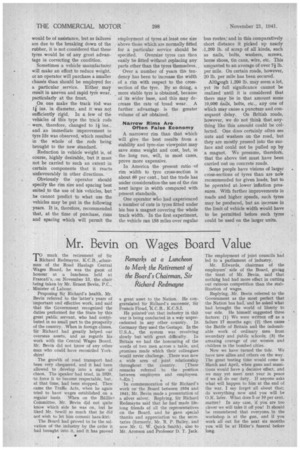Mr. Bevin on Wages Board Value
Page 30

If you've noticed an error in this article please click here to report it so we can fix it.
mark the retirement of Sir Richard Redmayne, K.C.B., .chairman of the Road Haulage Central Wages Board, he was the guest of honour at a luncheon held at Frascati's,. on November 13, the chair being taken by Mr, Ernest Bevin, P.C., Minister of Labour.
Proposing Sir Richard's health, Mr. Bevin referred to the latter's years of important and effective work, and said that the Government recognized the duties performed for the State by this great public servant, who had contributed in no small part to the prosperity of the country. When in foreign climes, Sir Richard had greatly helped our overseas assets, and as regards his work with the Central Wages Board, Mr. Bevin did not know of any other man who could have reconciled 'Yorkshire!
The growth of road transport had been very chequered, and it had been allowed to develop into a state of chaos. The speaker had tried, in 1020, to force it tobecome respectable, but, at that time, had been stopped. Then came the Traffic Acts, when he again tried to have wages established on a regular basis. 'When on the Committee, Mr. Bevin did not quite know which side be was on, hut he liked Mr. Sewill so much that he did not wish to let him commit hara-kiri.
The Board had proved to be the salvation of the industry by the order it had brought into it, and it has proved a great asset to the Nation. He congratulated Sir Riaiard's successor, Sir Francis Floud, K.C.S.I.
He pointediout that industry in thIS war is being conducted in a way unprecedented in any other country. In Germany they used the Gestapo. In the U.S.A., the system was revolving slowly but with great difficulty. In Britain we had the honouring of the words of two men across a table, and, promises made which their colleagues would never challenge. ,There was now a wide area cif joint relationship
throughout ' the country. [These remarks referred to the position between employers and employees. =En.]
In commemoration of Sir Richard's work on the Board between 1934 and 1941, Mr. Sevin made a presentation of a silver salver. Replying, Sir Richard Redmayee said that he had' made lifelong friends of all the representatives on the Board, and he gave special thanks and appreciation to the, secretaries (formerly, Mr. 'R. P. Bailey, and now Mr. G. W. Quick Smith), also to Mr. Aronson and Professor D, T. Jack. The employment of joint councils had led to a parliament of industry.
Mr. Edwards, chairman of the employers' side of the Board, giving the toast of Mr. Bevin, said that nothing had had more effect in cutting out ruinous competition than the stabilization of wages.
Replying. Mr. Sevin referred to the Government as the most perfect that the Nation has had; and he asked what had brought the world of liberty to our side. He himself suggested three factors: (1) We were written off as a failure 17 months ago; (2) then, came the Battle of Britain and the indomitable work of ordinary men from secondary and public schools; (3) the amazing courage of our women and children in the bombed cities.
Now we have turned the tide. We have new allies and others on the way. The great testing time would come in March and April, when guns and munitions would have a decisive effect, and we may yet meet next year in peace if we all do our duty. If anyone asks what will happen to him -at the end of the war, I say forget all about that do 'everything now and you will be O.K. later. What does 5 or 10 per cent. matter?. In any case, if you are too clever we will take it off you! It should be remembered that everyone. in the workshop is at the gun, and if you work all out for the next six months you will be at Hitler's funeral before long.




















































